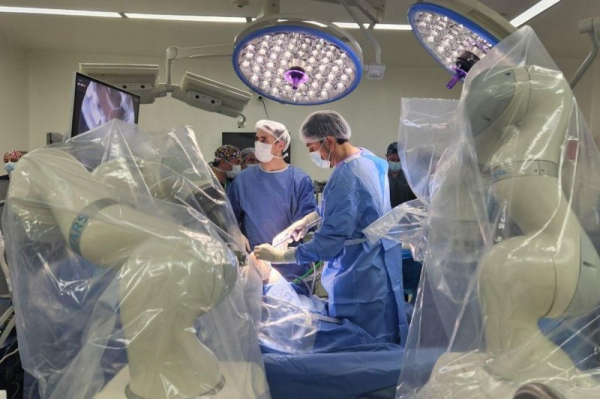First gallbladder surgery performed with help of AI-guided robot


The first autonomous surgery guided by artificial intelligence is performed in Chile. Photo courtesy of Levita Magnetics
Surgeons in Chile performed a pioneering gallbladder operation with the support of the MARS platform, a system that combines precision robotic technology with artificial intelligence.
For the surgery performed on Monday, a robot held a magnet that moves instruments inside the patient with one of its arms, while the other arm carried an autonomous surgical camera guided by AI.
The camera automatically zooms in and out and follows the surgeon’s movements, giving the medical team a clearer, uninterrupted view throughout the procedure without manual adjustments.
Normally, these types of surgeries require an assistant to adjust the camera at the surgeon’s request. MARS advanced on that model by allowing the surgeon to control the camera directly with hand or foot movements.
“It’s not that we didn’t already have a good view of what we were doing, but this is an added advantage. The camera follows the surgeon’s movements and can also be stopped and controlled manually, but it is trained to work autonomously, Dr. Ricardo Funke, head of surgery at Clínica Las Condes, who led the procedure, told UPI.
“This allows us to maintain a stable, high-quality view and to see with great precision what we’re doing during the operation.”
He added: “This is the first case in the world in which we have used artificial intelligence technology that is proven and safe for patients. Years ago, it was unthinkable that AI could be part of our daily work, and it is an area that will continue to advance.”
Dr. Matías Sepúlveda, president of the Chilean Society of Bariatric and Metabolic Surgery and a digestive surgeon at the private Clínica Las Condes, said the new technique avoids making additional incisions in an operation that is already minimally invasive.
With these advances, the goal is to have a positive impact on patients.
“That means less pain, faster recovery and lower costs for health institutions by reducing the number of assistants or surgeons needed during the operation. This is only the beginning, but it will have a major impact on what we do,” said added.
The technology was developed by Levita Magnetics, a Chilean medical startup based in Mountain View, Calif., that specializes in minimally invasive solutions for assisted surgery and magnetic technology.
In 2023, the company received authorization from the U.S. Food and Drug Administration for its MARS platform to be used in abdominal surgeries such as gastric sleeve procedures. In June, its use was expanded to bariatric repairs and hernia surgeries, which are among the most common procedures.
“We decided to perform the surgery in Chile because it is our base of operations. This is the first surgery of its kind, and our goal is to expand the use of AI everywhere our MARS robot is available, in both Chile and the United States,” Dr. Alberto Rodríguez, founder of Levita Magnetics, told UPI.
He added that this milestone is only the beginning of surgical autonomy. “Robots, which embody AI, will take on an increasingly important role in different stages of operations, allowing for safer procedures, more efficient surgeons and, ultimately, better outcomes for patients.”

